“We haven’t stopped the war yet”. What the anarchist underground is doing in Russia and how the security forces are looking for it
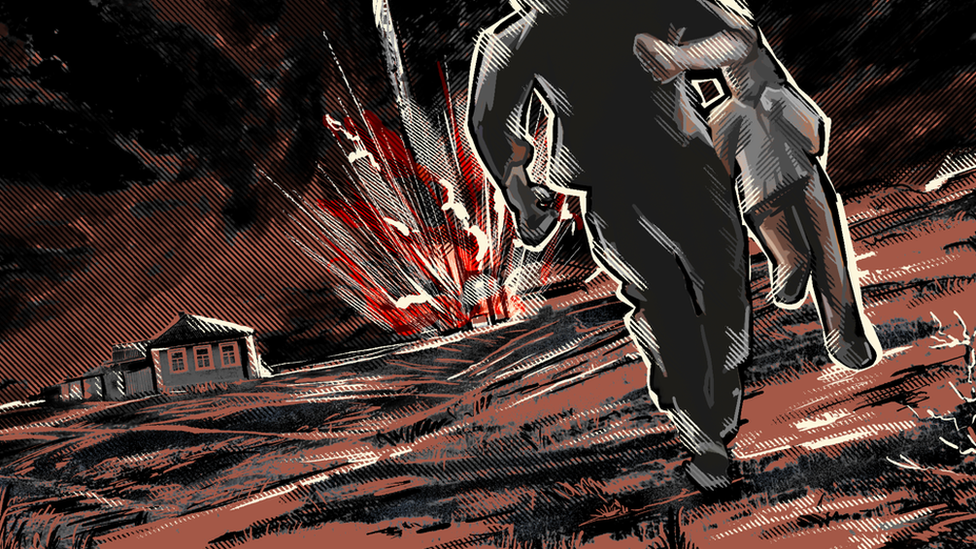
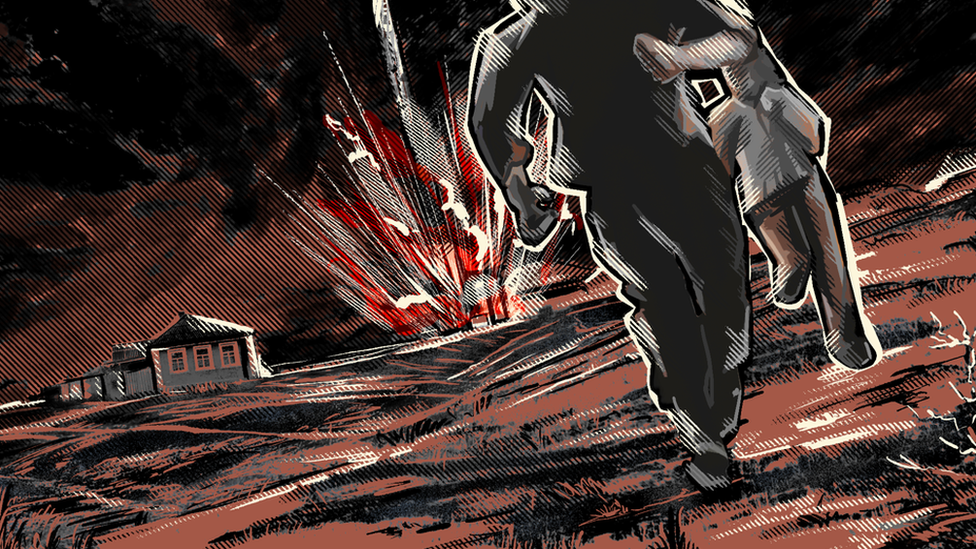
It is dangerous to protest against the war in Russia. The fight against Russian aggression in Ukraine is being waged both by underground groups and by those who act alone in ways that the Russian authorities in most cases qualify as terrorism and sabotage: damaging rails, dismantling tracks and setting fire to military recruitment centers. The security forces, trying to get at them, often interrogate random people. The BBC spoke to anarchists who have organized such underground struggles and to people who have been victimized by the security forces.
In late June 2022, unknown people dismantled rails on a railroad leading to a military unit near the town of Kirzhach in the Vladimir region. This is where the 51st arsenal of the Russian Defense Ministry’s Main Missile and Artillery Directorate is located.
On June 28, the Combat Organization of Anarcho-Communists (BOAK), left-wing radical activists who remain anonymous and who oppose Russia’s invasion of Ukraine, claimed responsibility for the sabotage by publishing a post in their Telegram channel. They define their approach to the struggle as “Direct action against structures associated with state repression and war, avoiding harm to civilians.”
According to their idea, the manipulations done to the rail were supposed to slow down the trains with weapons and equipment for the Russian military at least for a while until the divorced rails are repaired. “Every such step is minus shells and missiles that could have flown into peaceful Ukrainian cities,” the anarchists explained their motivation in their Telegram channel.
The anarchists left a link to it by writing in white paint on the broken rail. According to BOAC, a few days later they received a message via a feedback bot that included a video of the broken rail and the text: “Are you **** *** [crazy]? Faggots.”
“That’s how we knew the sabotage had been detected,” BOAC explained. The anarchists responded to the BBC’s questions in writing, using an anonymous e-mail address. A Russian anarchist in contact with BOAK confirmed to the BBC that the address belonged to the organization. The BBC editorial office has no photos or videos confirming the identity of the interlocutors.
They assume that the video was shot by one of the drivers – the noise of a running train can be heard on the recording. Based on the video (also posted on the BOAC channel), they concluded that the train was heading towards the military unit. The anarchists do not know whether this is true and whether the train reached the military.
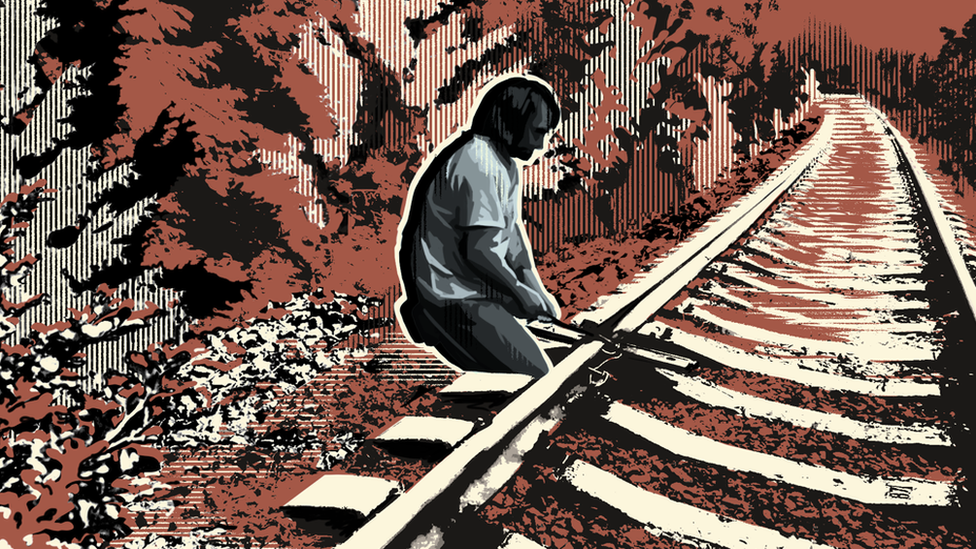
“P.S. Don’t trust the cops.”
In early July 2022, a week after BOAC claimed responsibility for the sabotage of a railroad near Kirzhach, Moscow resident Ivan Ivko, 35, and his wife Svetlana Orlova, 32, discovered that their Google accounts had been hacked. Another week later, they learned that a man had been filming the door to their apartment on his phone.
Ivko and Orlova are longtime anarchists. They have been involved in the left-wing protest movement since the late noughties. Over the past few years, they have watched their anarchist friends and acquaintances leave Russia.
People left the country out of fear of criminal prosecution – first amid rumors that the FSB was searching for the “Moscow cell” of the “Network” (the organization was recognized as a terrorist organization in Russia and banned, the defendants in the case received large prison sentences on charges of planning terrorist attacks, they themselves said in court that the organization was completely invented by the FSB and claimed torture). Then – against the background of mass searches and detentions of anarchists on suspicion of involvement in the “People’s Self-Defense” (also recognized as terrorist and banned in Russia). Mass repressions against this anarchist organization continued from 2018, and in 2020, long lists of people whom law enforcers allegedly believe to be NS members began to be published on social networks, and a new “exodus” from Russia began, Ivko recalls.
He and his wife had already come to the attention of law enforcement agencies in Moscow. At the end of 2010, they let anarchists from Belarus, who were being searched by Belarusian KGB officers because of their participation in protests, stay in their rented apartment. Together with their Russian colleagues, they came to Ivko’s apartment to search. The Belarusians were no longer in the apartment, but it was after that incident, according to Ivko and Orlova, that they themselves were “on the pencil” of the Russian security forces.
In 2011, the spouses noticed the surveillance. It was followed by a search and detention – the anarchists were suspected of involvement in the explosion at the traffic police post at the 22nd kilometer of the Moscow Ring Road. The Black Blog, an anarchist anonymous resource that also claimed responsibility for some of the arson attacks of the time, including the arson attacks on several military recruitment centers and a police checkpoint in Moscow and Moscow region, claimed responsibility for the attack.
The June 7 explosion at the DPS checkpoint was one of the most notable left-wing radical actions of 2011 and continues to be a “white spot” in the history of Russian anarchism. At that time, law enforcement agencies questioned many public Russian anarchists and anti-fascists, a dozen were detained, but eventually all were released for lack of evidence.
When Ivko and Orlova were searched, nothing was found, and they were released after successfully passing a polygraph at 38 Petrovka Street.
In recent years, the spouses were fond of shooting sports and held strikeball trainings for anarchists. At home, they kept strikeball and civilian weapons, for which they had all the documents and permits, but nevertheless they preferred not to publicize their hobby – in the infamous “Network” case, the defendants of which were also united by their love for strikeball, investigators used video recordings of their training in the woods as evidence that the defendants were preparing for terrorist attacks.
After the interrogations at Petrovka, Ivko and Orlova installed a video doorbell with a motion sensor on the front door, which records “guests” standing at the door on video and sends it to the owner’s phone. This is how the couple managed to detect surveillance in 2022 – Ivko received from the “smart” peephole a video of their door being filmed on the phone by an unknown person.
Despite the repression of anarchists and the constant departures of friends, Ivko and Orlova had no plans to leave Russia. They had never been abroad, they didn’t even have passports. But this time they did not wait. They decided not to take their phones for fear of being followed – Ivko threw his phone in the trash not far from home, Orlova left it in the apartment. They quickly packed their things and left for Belarus on the night of July 16, where they illegally crossed the border with the European Union.
The couple left a note to Ivko’s brother and his parents, who live nearby in Moscow: “We have to leave. As soon as we can, we will get in touch. P.S. Don’t believe the cops.”
As it turned out, at that time the police were already looking for Ivko and Orlova on suspicion of involvement in BOAC.

“Our turn has come.”
After the couple’s departure, the law enforcers began following Ivko’s 33-year-old younger brother Pyotr. Petr himself, a programmer and computer game developer, was far from being an activist and was not even into strikeball, unlike Ivan.
At first, his brother noticed “tight surveillance”, and in August he was detained on the street by police officers and taken to the Butyrsky IAB. The court arrested him for three days under the article on disorderly conduct, but after the hearing he was taken back to the police and questioned about his older brother – a detailed account of this was published by OVD-Info (this human rights project is recognized as a “foreign agent” in Russia).
According to him, the police were interested in where his older brother was and how he had left Russia without documents (as it turned out, the police were aware that Ivko and Orlova did not have passports). After that, the police “began to claim that my brother was a terrorist and that there had recently been a terrorist attack, about which I allegedly knew for sure, and therefore I was an accomplice of the terrorist and a terrorist myself”.
At one point, the police wrote on paper the phrases that Pyotr should say to his brother on the phone. “Then we called my brother – he picked up the phone, I started reading out what the police officers had written: ‘Hi. I’m with the police. I’m speaking without pressure. Everyone knows about you. We need you to come down here. It’s best for me, for dad, for mom and for my wife.” My brother hung up,” Pyotr recounted the conversation with his brother to OVD-Info.
“We realized that he was detained and speaking under duress. There was a feeling of helplessness, that there was some kind of tragedy going on and we couldn’t do anything about it. You sit there and realize that you are safe, but there, many kilometers away, your brother is probably being tortured,” Ivan Ivko shares his impressions from that conversation with Pyotr.
According to him, Pyotr was really tortured at that time. The police wrapped his hands with duct tape, put a gag in his mouth, which they also duct taped to his face, attached wires to his thumbs and started to electrocute him, while also beating him. While torturing him, the police kept asking Piotr where his older brother was.
That day Ivko was eventually taken to a cell, and in the morning he was taken to a special detention center, where he served the three days of his arrest. After that, the law enforcers did not remind Ivko of themselves for some time, until they came to his home on September 13 to search his house.
The ruling presented by the law enforcers stated that the search was conducted under Article 267, Part 1 of the Criminal Code (disrepair of communication routes, the maximum penalty under this article is one year of imprisonment). The case itself was initiated on June 26 over the dismantling of the left rail chain of the “non-use” railroad leading from Kirzhach station to military unit #55443.
It followed that the law enforcers examined the dismantled rail on June 25 and found a link to the BOAK telegram channel on it. During the investigation, they also found the channel “Combat Anarchist”, in which they saw calls for violent actions and found photos of the railroad near Kirzhach. In the BOAK channel investigators also found a post about the May action of anarchists on the railroad in the Moscow region.
In late August, investigators concluded that Ivko, Orlova, their younger brothers, their parents, and Ivko’s grandmother may have been involved in the dismantling of the rails near Kirzhach. How, according to the investigation, all family members could be involved in the incident is unclear. Searches in the case took place at five addresses, including the home of the 78-year-old grandmother Svetlana Orlova. All but Ivko and Orlova, who had left the country, were taken away for questioning and then released.
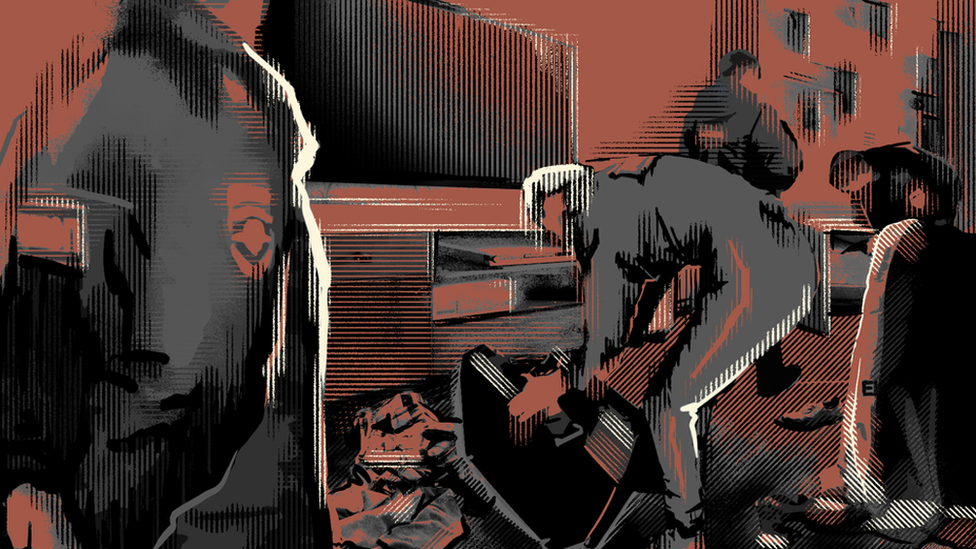
“Treating a cat and tuning a traumatic gun.”
The search of Ivko and Orlova’s apartment resulted in the seizure of many strikeball weapons and about seven thousand rounds of ammunition – for all this, according to them, they had a permit and the law enforcers did not find anything illegal in their home. “Well, we liked to practice shooting. It takes about 200 cartridges per person for one training session,” Ivko explained the number of cartridges found in their home.
According to Ivko, before the surveillance and forced departure from Russia in July, he and his wife knew about BOAC and “followed with interest – but without signing up so as not to draw attention to themselves.” “We support the struggle against dictatorship,” the couple say. And refuse to answer further questions about their involvement in the rallies. The BBC was unable to independently verify whether Ivko and Orlova were involved in BOAC and the rail defacement actions.
What exactly they were doing at the end of June, when BOAC dismantled the railroad track, Ivko and Orlova “don’t remember”. They were definitely treating their cat Shura for thyroid disease – and they say they were at the veterinary clinic on one of those days. The spouses could not provide receipts or photos from there – according to Ivko, it is difficult to find them now: “After the search, everything was ransacked”. Ivko recalls that he was still busy tuning a Glock TK717T strikeball traumatic pistol.
“There’s hope that they’re afraid to drive loads.”
“The Militant Organization of Anarcho-Communists” appeared several years ago. It was founded by “people with a strong activist and anarchist background,” alleged BOAC members told the BBC. The organization’s members operate mainly in Russia and the former Soviet Union, the anarchists said, without specifying where.
The BOAC refused to specify the exact number of participants. According to them, it is about a dozen people. In addition, the anarchists are actively communicating with their supporters and other “guerrilla” groups in the regions – they are trying to exchange experience.
Before the Russian invasion of Ukraine, anarchists from BOAK, according to their assurances, were mainly engaged in organizational issues, building up the number of participants and propagandizing their ideas through the “Fighter Anarchist” Telegram channel. Their goal was “revolutionary transformation in Russia” and “reorganization of people’s lives according to the ideals of anarcho-communism.
In contrast to variants of the political system based on relations of domination and subordination, anarchy presupposes the absence of the state, that is, it appeals to free and responsible life, BOAC is convinced. The prefix “communism” in the name specifies the forms in which an anarchist society can exist – with the creation of councils that unite people in their neighborhoods and allow them to make collective decisions.
Until February 2022, BOAC members carried out some actions, but which ones, where and when, the anarchists do not specify. They did not take responsibility for them publicly, so as not to arouse the increased interest of the authorities, and tried to use their obscurity “to build up their forces”.
In early February, against the background of Russian-Belarusian military exercises near the Ukrainian border, BOAC decided to act. The members of the organization held an online organizational meeting and agreed to “switch to guerrilla actions on behalf of the organization” in case of war. “As anarchists, we are disgusted by the war against the brotherly Ukrainian people,” the anonymous members of BOAK reasoned.
By January 2023, they had claimed responsibility for four “actions”. In mid-April, the anarchists reported setting fire to a cell phone tower in the village of Belomestnoye, Belgorod Oblast – in order to disrupt communications of the Russian military. In late May, they described sabotaging railroad tracks on a railroad that leads to one of the military facilities of the 12th Main Directorate of the Russian Defense Ministry’s 12th Main Directorate in the Moscow region, and then, almost a month later, they allegedly carried out a similar “action” near Kirzhach.
On January 4, 2023, BOAC claimed responsibility in their Telegram channel for blowing up a railroad bridge leading to a Defense Ministry facility. Where exactly and when the incident took place, the anarchists did not specify. Speaking to the BBC, they said they had blown up one of the bridges in the Central Federal District, without specifying the region: “Even if the damage doesn’t stop trains from traveling, the hope is that after the publication they will be afraid to carry freight until all the bridges are rechecked, and this will also buy extra time.” The BBC has no other evidence of what happened other than BOAC’s words.
The explosion was “not 100% effective,” the organization said in a statement, and its effects are unknown. The BOAC hopes that further use of the bridge after the explosion will “likely exacerbate the damage, making it even more expensive to repair”. As a result, it will slow down the transportation of military supplies, the organization believes.
BOAC also told the BBC that they had previously “repeatedly organized and participated in attacks” on targets such as police, administration buildings and military recruitment offices, but did not specify when – before Russia’s invasion of Ukraine began or after – or where exactly this took place.
The anarchists find it difficult to assess the effectiveness of their activities. On the one hand, we have not yet stopped the war, and anarcho-communism has not yet been built,” they said in a conversation with the BBC. – On the other hand, the Russian offensive has been stopped one way or another, and we dare to hope that we have a share of the credit for this.
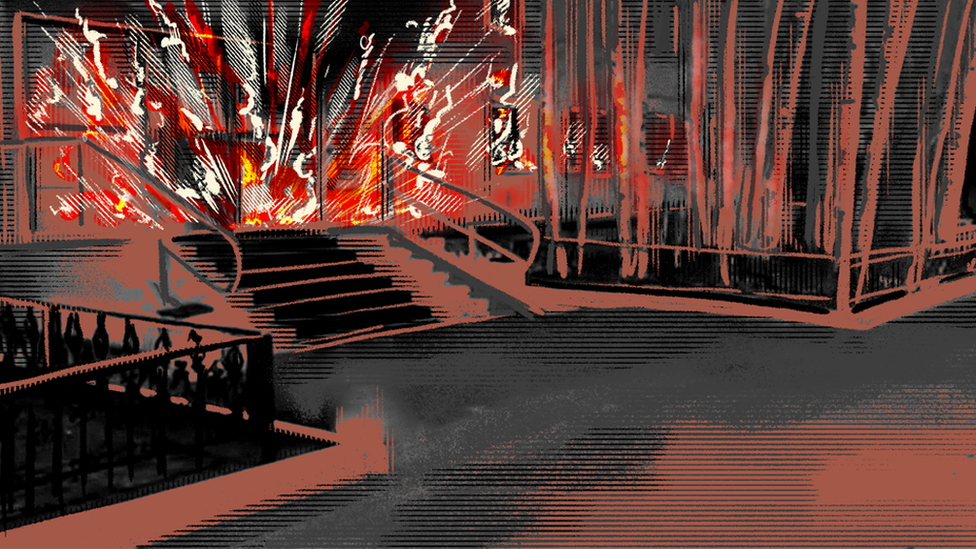
“One operator, one sentinel, one actionist.”
BOAC plans all of its actions carefully. First they choose “what is more effective to attack.” “What will be more talked about and what will generate more support from people. And therefore – and motivate other people to do the same,” they write.
Anarchists say they prefer not to organize actions alone, but to act as a team of at least four people: “one operator, one sentinel, one actionist”. “But ideally put several sentries to block possible directions of the enemy’s approach. It is better to have several actionists to increase the efficiency of the action.
The BOAC assures that when planning actions, they try to foresee all risks in advance, “so that no one not involved or responsible for crimes against the people will be harmed”: “If we see that the probability of such a thing is high, we change the plans”.
According to the anarchists, when preparing the actions on the railroads, they made sure in advance that there were no passenger trains running along the tracks they planned to dismantle: “We are 1000% sure of this. We have scouted the sites beforehand on Wikimapia, the railroads under attack are single tracks leading to military installations.” The BBC has no confirmation or denial of this information.
“A partisan should not attract attention.”
“Our main security measure is filtering information about ourselves. Constant self-control of what you report and to whom,” the BOAC correspondence tells us.
The main rule that anarchists adhere to is not to use personal means of communication for underground activities. Each participant must have a separate phone, a separate e-mail account, used only through the anonymous Tor browser. “Work” phones they never turn on at home or nearby, “only in different cells and with a delay,” the anarchists add.
They say that they do not store anything related to BOAC activities on their personal computers. Anarchists seek all information for actions using Tor or VPN. During reconnaissance and actions anarchists use changeable disposable clothes and hide their faces. They make up an alibi for each such outing, in case they are found on surveillance cameras, as well as for relatives and colleagues.
“A partisan should not attract any attention. On the face of it, he should lead an absolutely ordinary life of a ‘simple man’,” the organization believes.
In May 2022, anarchists launched the “Revolutionary Anarchist Fund,” through which they raise money in the form of cryptocurrency. Anarchists say that other local groups are also asking for support, but “due to the limited fund” they support only those “who have already proven themselves in some way”: “We ask for prufs of attacks – photos or videos (without faces, figures, with metadata removed). The only criterion here is the ‘partisanship’ and radicality of the attack.
BOAC says they have received about three and a half thousand dollars in donations since the foundation’s inception.
Both in the entire existence of BOAC in general and since Russia’s invasion of Ukraine in particular, not a single member of the organization has been detained, the anarchists claim in correspondence with the BBC.
“Only the flags were taken.”
Ivan Ivko and Svetlana Orlova were the first people known to be suspected by Russian security forces of having links to BOAC. Later searches began in other regions, in some cases of people very far from anarchism.
Thus, at the end of November 2022, 44-year-old Angarsk resident Sergey Serdechkin was visited by FSB officers. They rang the doorbell for more than an hour and a half, after which he opened the door and they showed him an order to inspect his apartment issued by a local judge.
The ruling stated that the purpose of the inspection was to check Serdechkin for “involvement in the activities of an extremist community (“Combat Organization of Anarcho-Communists”)” (at the moment Russian authorities have not officially recognized BOAC as an extremist organization – BBC), and among the search items were weapons, equipment, prohibited substances and extremist symbols, Serdechkin told the BBC (he did not photograph the document himself).
“I was pretty surprised,” he admitted.
The fact is that Serdechkin is not and never has been an anarchist.
For several years, in 2019-2020, he was a member of the communist “Union of Marxists,” which was founded by Marxist blogger Andrei Rudoy. The members of the “Union of Marxists,” according to Serdechkin’s account, were mainly engaged in “circle education for aspiring Marxists” and “support for the trade union struggle” – he himself, for example, participated in the creation of a trade union “primary branch” in an Angarsk hospital.
Serdechkin actively participated in the life of the “Union”, but quickly burned out. In addition, in the fall of 2020, his grandmother became seriously ill, and the man decided to retire from public and political life for family reasons.
According to his assurance, he did not know much about BOAC before the law enforcers came: “At least, when the FSB officers searched my apartment, I tried to find out from them what BOAK was. And they said: “Official secret!”.
The FSB officers were not interested in anything in Serdechkin’s apartment. Having found no signs of Serdechkin’s involvement in BOAC, they gave him to sign the inspection report and left. “Since the officers worked this time without offense (which is not always the case in Russia), and very politely, I did not make a fuss,” Serdechkin explained to the BBC.
A similar situation occurred in early December in Irkutsk – FSB officers searched the home of a local left-wing activist who had previously only participated in anti-war protests, he told the BBC. He requested anonymity out of concern for his safety. During the search, law enforcers asked the man if he knew about the BOAK and Combat Anarchist channels, but he said he had only learned about them from intelligence officers. After the search the law enforcers did not seize anything and left.
According to the BBC, an activist in Nizhny Tagil, who holds communist views, was also searched in connection with the activities of BOAC, but the law enforcers were not interested in his home either. The activist himself did not want to talk to the BBC.
In November, police searched the homes of several anarchist students from the Trans-Urals, one of them told the BBC (he asked not to specify the region for fear of attracting the attention of the authorities again).
The search warrant said he was suspected of participating in BOAC and making explosives, the student recalled.
During the search, police officers, according to him, asked about BOAC: “They asked me if I knew anyone from this organization, how I felt about their activities. They asked if I knew any activists who had already been visited.
In the end, only the old “leftist and anarchist flags” were taken away, he says. A month later, the police came again, but this time no one opened the door.
“We sincerely sympathize with our comrades and urge them to hold on,” the alleged BOAC members commented in correspondence with the BBC on searches of activists in different regions on suspicion of involvement in their activities.
23 years for rail partisans
BOAC is not the only one who considers sabotage on railroads an effective method of fighting. Belarus started sabotaging train traffic back in 2020. In this way, local “partisans” tried to economically weaken the regime of Alexander Lukashenko. In October 2020, the Interior Ministry of Belarus stated that 57 cases of imposing foreign objects on the rails had been recorded in the country since the beginning of the year.
After February 24, sabotage of railroads started to take place again in Belarus, from the territory of which, among others, Russian military invaded Ukraine. The media dubbed them the “rail war” – those who disagreed with the invasion tried to sabotage the movement of trains to stop the shipment of military equipment and reinforcements for the Russian military in Ukraine.
On December 27, 2022 a court in Belarus sentenced three “rail partisans” from Svetlahorsk to terms from 21 to 23 years in a reinforced regime colony on charges of terrorism, high treason, deliberate damage of communication lines and participation in an extremist community. According to the investigation, on February 28, they set a fire on the railroad leading to Ukraine.
The Belarusian edition of Zerkalo writes that so far this is the harshest sentence passed for sabotage on the railroad. The previous harshest sentence was 16 years.
- Hacktivists, IT army or terrorists: how hackers from Russia, Belarus and Ukraine operate in times of war
“At least five attempts have been made to try to set the railroad on fire.”
Soon after the start of the “rail war” in Belarus, anonymous groups began calling for similar sabotage in Russia.
On November 2, it became known that four students aged 17-18 were arrested in Ufa on charges of sabotage on the railroad. Moreover, the case against them was brought under the article on organization of terrorist acts by a group of persons, the punishment for which is from 12 to 20 years of imprisonment. According to the investigation, the accused, opposing the so-called “special operation” in Ukraine, tried to set fire to the railroad at least five times in order to “destabilize the work of the Bashkir authorities.
Former Russian President and Prime Minister Dmitry Medvedev reacted to the detention of the students on the same day in his Telegram channel. He called the detainees “freaks” and suggested that the current moratorium on the death penalty in Russia “can be overcome if necessary.
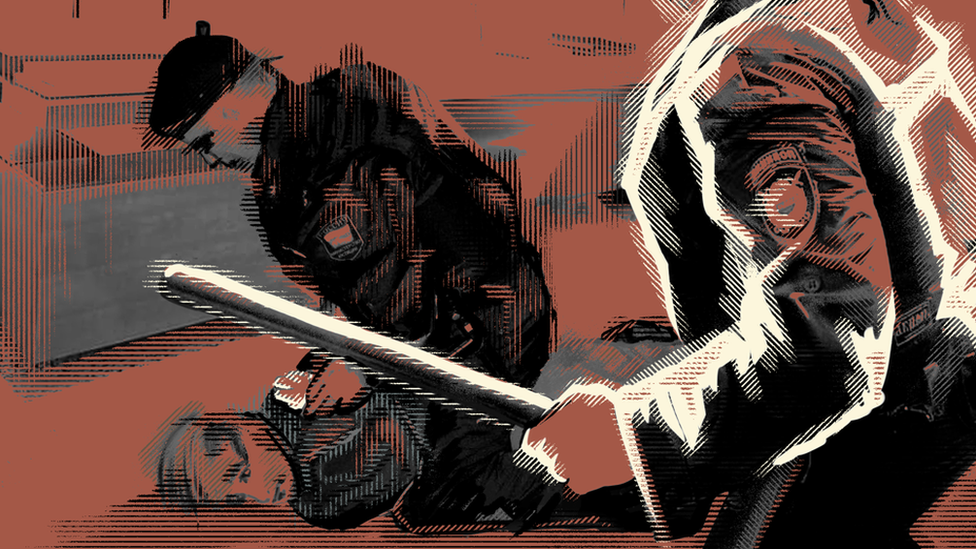
In mid-November, social networks reported that Ilya Podkamenny, an 18-year-old employee of the Subway fast-food chain, was detained in Irkutsk for allegedly wrapping wire around the rails in order to disrupt train traffic. He was prosecuted under articles on preparation of a terrorist attack and on public calls for extremist activity – according to the investigation, he attached sheets from a notebook with a message of “extremist content” to the rails. Now Podkamenny is under house arrest.
At the beginning of December, a court in St. Petersburg banned a Telegram channel that published instructions on how to carry out various sabotage operations on the railroad. The court considered it “morally corrupting citizens” (the channel currently has more than ten thousand subscribers).
The BBC has not been able to find out who administers this resource. The channel regularly disseminates news about various incidents on Russian railroads and publishes photos of derailed cars, attributing most of these cases to the activities of “partisans”. At the end of October, the channel was even included in one of the daily reports published by British intelligence, which said that the group had taken responsibility for the sabotage of tracks in the Bryansk region.
At the end of August 2022, the channel published data according to which in six months in Russia there were allegedly more than 300 sabotage attacks on railroads, more than 80 derailments of freight trains, and the geography of “railway resistance” spread over 85% of the country’s territory. Exactly how this was calculated is unknown, and it is difficult to verify these figures.
There are no official statistics on accidents on railroad tracks. News about derailed cars regularly appears in the Russian regional media – both freight and passenger trains have been involved in such accidents over the past year.
It is difficult to determine whether such incidents were caused by sabotage or something else. At the same time, no major incidents involving trains carrying military equipment have been reported recently. Although derailments of military train cars have been recorded in previous years.
At the beginning of January, a Telegram channel banned by the St. Petersburg court reported about allegedly more frequent cases of car derailments on the Transsib. In Russian local media there are no references to accidents on the Transsib. The administrators of the Telegram-channel connected it with “silence of the work of resistance in mass media”.
On January 5, 2023, the FSB reported on the detention of three people allegedly preparing a sabotage on a section of the Trans-Siberian Railway in the Chelyabinsk region. According to RIA Novosti, all detainees were arrested and face up to 15 years in prison for attempted sabotage.
On February 1, the FSB announced the detention of three Russians, who, according to the agency’s version, were involved in the “preparation and commission of terrorist attacks on railway infrastructure facilities in the Sverdlovsk region”. Earlier on Monday, the FSB announced the detention of three eighth-graders suspected of damaging railroad tracks in the Moscow region. In both cases, the special service emphasized that the detainees committed crimes “for monetary reward.”
The BBC Russian Service asked Russian Railways whether cases of sabotage of railroads are really increasing in Russia, and also sent requests to the FSB and the Investigative Committee on the progress of investigations into such criminal cases and is awaiting a response.
“All of them openly oppose Russian military aggression”
At the end of December, Putin signed a bill to toughen penalties for sabotage activities. Now the penalty for organizing such activities includes life imprisonment. Previously, only sabotage that resulted in the death of a person was punishable in this way.
The Solidarity Zone, a small human rights initiative established in the spring of 2022, following Russia’s invasion of Ukraine, provides assistance to those arrested for anti-war “direct action”. As Solidarity Zone explained to the BBC, they decided to focus on such prisoners “because no one is dealing with them”: “Most human rights organizations do not help authors of direct action actions for various reasons.
“The most common action is an attack on some government building: a military recruitment center, a building of the Rosgvardia, and so on.” More often than not, a criminal case is initially opened under articles on hooliganism or property damage, and then reclassified as terrorist.
“We know of only a few cases where cases were left in their original status. Most recently, a resident of Transbaikalia was fined 20,000 rubles for setting fire to a military recruitment center. He threw a bottle with an incendiary mixture into the building; the liquid did not catch fire, but the facade of the building was spoiled. He was tried under the article on “discrediting” the Russian army, because he tried to set fire to the military recruitment center, feeling “negative attitude to the partial mobilization,” human rights activists told the BBC.
Now the “Solidarity Zone” (most of its employees continue to work in Russia) supports 12 people – mostly people arrested for attempted arson or arson attacks on military commissaries and buildings of power structures. “All of them have and are openly opposed to Russian military aggression or have stated their anti-war views in testimony.” People in the dock for committing radical anti-war actions are usually people who acted alone. No one has yet confessed to membership in BOAC.
“These are people of absolutely different ages from 20 to 61, with different interests, from different regions of the country,” they say in the Solidarity Zone. – Some were activists before the war, some were not. They all have very different views, but it’s hard to call any of them “radical” in the usual sense of the word. We have not yet met a case where people planned such actions before the full-scale invasion of Ukraine by Russian troops.
Ivko and Orlova requested political asylum in Lithuania. They are not yet allowed to work officially. They live on personal savings, accept help from friends and learn Lithuanian. Their brother Pyotr stayed in Russia. The investigation of the case of rail damage on the railroad near Kirzhach continues. The FSB of Russia constantly reports about detention of the next teenagers for spoiling the railroad. On the last day of January the first sentence under the article “terrorist act” for arson of a military recruitment center was passed – 20-year-old resident of Nizhnevartovsk Vladislav Borisenko received 12 years in a strict regime colony.
BOAC still do not reveal their names. In early January, the British media project Popular front released a 20-minute film where it interviewed on camera two young people – a boy and a girl – who introduced themselves as BOAC members and spoke about the organization’s activities. They spoke with covered faces and altered voices, and the filming, the movie claims, took place in Eastern Europe.
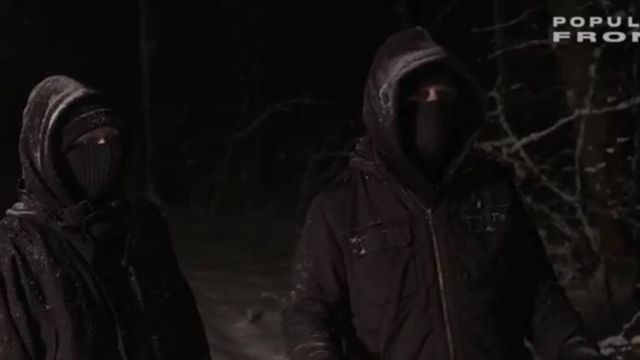

On the Russian anarchist movement
Says a Moscow anarchist who has participated in the life of the movement since the 1990s and asked for anonymity:
“Anarchists, after they reappeared in Russia after perestroika, never constituted a single organization, but rather a network of different circles and initiatives. In 1991 there were three anarchist barricades near the White House, in 1993 anarchists could not support either side of the conflict and so formed a sanitation vigilante that helped victims on both sides. In the early 2000s, when the problem of street fascism became acute, anarchists played a major role in the formation of the anti-fascist movement.
Over the last ten years, the anarchist movement in Russia has experienced constant persecution and repression. A significant part of those repressed in the “Bolotnaya case” (a criminal case on mass riots initiated after the May 6, 2012 protest on Bolotnaya Square – BBC) were anarchists.
With the outbreak of war in Ukraine, repression and persecution only intensified, and the anarchist movement is not a big organized force now. It has lost a lot of people – some have gone to jail, some have withdrawn, some have left. Now there is quite a large Russian anarchist emigration – there are anarchist diasporas in Finland, Georgia, Armenia. There are very few active people left in Russia. Now almost all activity has become impossible, and there are regular attacks by security services or pro-government activists on some of the most innocent events.
The anarchist movement in Russia has always been very small, very unorganized, very youthful. Since 2000, Autonomous Action has existed for almost 15 years as the largest anarchist organization. But still, the overwhelming majority of anarchists were not members of any organizations. In 2013, Autonomous Action split, and People’s Self-Defense (recognized as terrorist and banned in Russia) split from it. Now 95% of modern anarchists are not members of any organizations.
From the 1990s until recent years, anarchists operated in Russia in a “gray” zone – between complete legality and complete illegality – there were some publications, websites, centers. They were not registered with the state, and from time to time they were subjected to repression, but they could still exist. Now, in general, almost nothing is allowed, so it’s not surprising that those who are left have been thrust into an underground situation. Not because they initially dream of it, but because it’s fairly inevitable. There are three options left – leave, stop engaging in any activity at all, or change it.
But if there is some underground activity, it should be understood that even when there was no war and anarchists were allowed to do something, “legal” known anarchists have always been fundamentally separate and could not be associated with the underground for obvious reasons – they are all quite well-known and are under the close scrutiny of the FSB and the Center for Combating Extremism (Center “E”). Therefore, if there are people who take responsibility for such actions, they, of course, act separately, anonymously, and do not show up at any demonstrations and meetings”.
